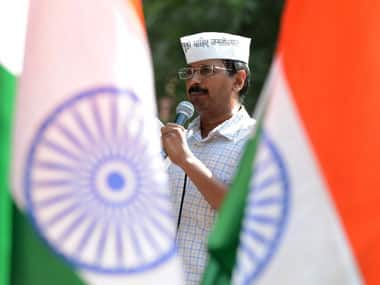LONDON: “This is a generational war. It’s a victory of democratic rage…They’ve failed, both left and right. They’ve been there for years and they’ve led the country into this catastrophe… They won’t last long. Not long at all." No, this quote is not from Arvind Kejriwal but Beppe Grillo, leader of Italy’s Five Star Movement (M5S) which, like the Aam Aadmi Party (AAP), came from nowhere to capture the popular imagination winning more than 25 per cent of the national vote in this year’s general elections and emerging as a king-maker in a hung parliament. A feisty stand-up comedian and blogger, 64-year-old Grillo was hailed as a messiah by an electorate fed up with mainstream parties seen as corrupt, exploitative and incapable of good governance. The media called it a “stunning turn of events’’ and attributed the rise of this citizens’ network-turned-political party to people’s yearning for a “new kind of politics’’. [caption id=“attachment_128330” align=“alignleft” width=“380”]  AFP[/caption] “One in four Italians voted for a party that says no to almost everything,” said Franco Debenedetti, a columnist for Il Sole 24 Ore newspaper. But like AAP, it refused to enter into any “messy deals’’ with other parties to form a government. “Not even small messy political deals…We’ll have 110 people in parliament and we’ll be millions outside," declared Grillo arguing in the manner of Kejriwal that to join hands with parties he fought against would be a “betrayal’’ of his supporters. What followed has a grim lesson for AAP as it basks in the glory of its sensational political debut. The party has since split. It was routed in local elections in the summer– failing to win any of the 564 towns and cities where it contested. Grillo himself has become a butt of jokes. The story of Five Star Movement, which went from zero-to-hero-to-zero again under a popular but uncompromising leader, illustrates the perils of being mesmerised by AAP-style election victories achieved on the back of an emotional anti-establishment public backlash. It also highlights the danger of turning politics into a morality play as AAP is doing with its touch-me-not approach for fear of being “contaminated’’ by other parties. Grillo did the same. And look, what happened to him. He paid the price for daring to dip his feet into water but not wanting to get them wet. Is Kejriwal set to become India’s Grillo? The Five Star Movement is not the only one-day wonder cooked in the heat of “democratic rage’’. Across Europe, there has been a surge in a kind of “anti-politics’’ political trend in the wake of the economic crisis as newly-minted parties have mined public anger against the system to take centre-stage briefly, and then lapse into obscurity. The phenomenon of the political “lone-ranger’’ has become so common that it has even ceased to excite. At the last count, there were at least ten such parties –a mix of left, right and centrist tendencies–with a variety of agendas ranging from corruption, cronyism and bad governance to immigration, euro-scepticism, anti-globalisation and cuts in public spending. Irrespective of their specific demands, the bottom line is their opposition to the current dispensation which, they say, represents “old politics’’ that is out of sync with the public mood and people’s aspirations. The laundry list of grievances reads very much like that of AAP. And all hail their campaign as “revolutionary’’. Typically, Jean-Luc Melenchon, leader of France’s Left Front which came from behind to take the fourth place in the 2012 French presidential elections winning 11 per cent of the votes, described his party as representing “the people of French revolutions and rebellions”. Which, translated into Hindi, sounds a lot like Kejriwal’s description of AAP as “aam aadmi ka andolan’’ and a “kranti’’. Less than two years later, nobody gives a toss for Melenchon and his “revolution’’. In Belgium, little-known Vlaams Belang (Flemish Interest) grabbed headlines winning 12 per cent of the national vote in the 2007 elections on a platform of immigration and independence for Flanders. But gradually as passions cooled down and “normal’’ politics resumed, it started to lose steam and in the 2010 elections its vote fell to less than eight per cent. Desperate to regain ground, it has embarked on an Islamophobic campaign “Women Against Islamisation’’ featuring, its leader Filip Dewinter’s teenaged daughter in a burka and a bikini. In Britain, the far-right British National Party (BNP) shocked the three main parties—Conservatives, Labour and Liberal Democrats—with a wave of victories in local elections four years ago forcing immigration to the top of the national agenda. For the first time it won two seats in the European Parliament and its leader Nick Griffin gained enough respectability to be invited by the BBC to its prestigious Question Time despite protests from rights groups. Since then, the party has gone steadily downhill with many of its leading lights leaving it to form their own groups or join other parties. Ask about its once high-profile leader and the answer you are likely to get is: “Griffin who?’’ This is not to say that all anti-establishment parties have failed. The most successful has been Syriza, a coalition of left and radical groups, which shook the Greek political establishment when it came close to winning the 2012 general election under its young and charismatic leader Alexis Tspiras. But then it was not a new party and had a well-organised base and clear policies. It would be churlish to write off AAP or belittle its achievement even before it has taken off , but there are lessons for it to learn from the European experience if it doesn’t want to end up as another flash-in-the-pan lone-ranger.
It would be churlish to write off AAP or belittle its achievement even before it has taken off , but there are lessons for it to learn from the European experience if it doesn’t want to end up as another flash-in-the-pan lone-ranger.
Advertisement
End of Article


)
)
)
)
)
)
)
)
)



